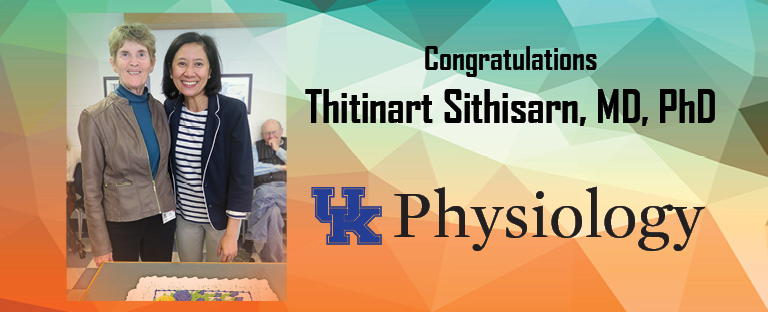Graduate Student Successfully Defends Dissertation
On Friday, March 31, 2017 Thitinart Sithisarn, MD successfully defended her dissertation and earned her PhD. Dr. Sithisarn completed her research while simultaneously holding a faculty position in Pediatrics.
Dissertation Committee
Dr. Sandra Legan
Department of Physiology, Mentor
Dr. Ok-Kyong Park-Sarge
Department of Physiology
Dr. Melinda Wilson
Department of Physiology
Dr. Susan Barron
Department of Psychology
Outside Examiner
Dr. Octavio Gonzalez
Dentistry, Center for Oral Health Research
Abstract of Dissertation
Opiate addiction is now a major public health problem. Pregnant women continue to use opiates during gestation; up to 5.4% of pregnant women report using illicit drugs during pregnancy. Previous studies have shown that perinatal insults and exposure to opiates such as morphine in utero can affect the development of the hypothalamic-pituitary-adrenal (HPA)-axis of the offspring and are associated with higher risk of developing neurobehavioral problems. Oxycodone, a semisynthetic putative kappa opioid receptor and partial Mu- opioid receptor agonist is now one of the most frequently abused pain killers during pregnancy, however limited data are available regarding whether and how perinatal exposure to oxycodone (POE) alters the development and functions of the HPA-axis, the related stress axis and neurobehavioral outcomes of the offspring. We have provided novel evidence that POE indeed is associated with sex-specific changes in the HPA-axis in response to stress that persist beyond the neonatal period. POE is associated with an increased adrenocorticotropic hormone (ACTH) response to corticotropin-releasing hormone (CRH), but not the corticosterone (CORT) response to CRH stimulation in late adolescent male offspring. Adult female, but not male rats exposed to oxycodone in utero have an increased CORT, but not ACTH, response to restraint stress test. These changes in the HPA-axis response to stress may be partially explained by 1) an increase in the subpopulation of CRH neurons that also contain estrogen receptor-Beta immunoreactivity following POE which then can exaggerate the feedforward stimulation of the HPA-axis, and 2) a decrease in mineralocorticoid receptor-mRNA expression in the hippocampus which may be associated with impaired negative feedback control of the HPA-axis by the limbic system. POE is also associated with cardiovascular changes in response to stress during a classical conditioning paradigm, such that adolescent male rats exposed to oxycodone in utero have a larger blood pressure increase than the control group. Although POE male rats can properly discriminate the stress versus non-stress cues in the paradigm, they seem to lose the retention of memory when retested during adulthood. When tested for learning and memory in a water maze, however, we did not find any differences between control rats and rats exposed to high dose oxycodone in utero. But we demonstrated that exposure to the lower dose of oxycodone in utero is associated with hyperactivity in adult rats when tested in an open field. Our results make a significant contribution to the literature because they extend our knowledge about the effects of oxycodone on the developing brain and the outcomes in animal models that are actually relevant to a current major public health problem in humans and will provide a platform for us to further study the underlying mechanisms and interventions that may mitigate these effects.
Acknowledgments
This dissertation benefited from the insights and direction of several people. First, my Dissertation Chair and adviser, Dr. Sandra Legan, who exemplifies the high quality scholarship to which I aspire. Next, I wish to thank Dr. Susan Barron and Dr. Melinda Wilson for their laboratory supports and critical comments. I would also like to thank other Dissertation Committee member, and outside reader, respectively: Dr. Ok-Kyong Park-Sarge and Dr. Octavio Gonzalez. Each individual provided insights that guided and challenged my thinking, substantially improving the finished product. In addition to the technical and instrumental assistance above, I received equally important assistance from family and friends. My husband, Dr. Jozsef Stork provided on-going support throughout the dissertation process. My mother, Pranee Sithisarn, PharmD, MS, who instilled in me, from an early age, the desire and skills to obtain the Ph.D. Finally, I wish to thank Dr. Henrietta Bada, my career mentor for her support and advice.
